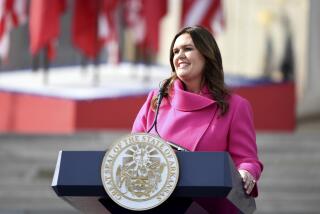Clinton Orders Easier Medicaid Rules for States
- Share via
WASHINGTON — Signaling his sympathy with his former fellow governors, President Clinton on Monday took steps to help states run their Medicaid programs by streamlining government procedures and possibly even paying a larger share of the costs.
Clinton said he had ordered administrators to improve the process by which states seek waivers of Medicaid rules. He also said federal officials will reopen negotiations on some federal contributions to the joint federal-state Medicaid program--a step that could add as much as $11 billion to the federal government’s costs of providing health care for the poor.
Governors have long complained that the process for seeking Medicaid waivers is “Byzantine and counterproductive,” Clinton said. “They are right.”
“This will be one big step on the long road to giving this country the health care system it needs,” he said after a two-hour meeting with governors at the White House.
States seek waivers of Medicaid rules when they want to try different types of programs that they believe will save money or serve poor people better.
The President’s action marked the start of a White House effort to influence news coverage by scheduling domestic policy initiatives that highlight the core of his agenda.
In a speech today, Clinton plans to ask the governors to join him in setting up a national task force to develop plans to fulfill his campaign promise of “ending welfare as we know it.”
“This is what Bill Clinton feels he was elected to do, make progress on some of these issues, rather than some of the ones that have been predominating,” a senior White House official said.
Media reporting on the first 10 days of the Administration dealt largely with sudden and unexpected controversies over Zoe Baird’s nomination as attorney general, a possible broad energy tax and Clinton’s attempt to allow gays to serve openly in the military.
Earlier this year, Clinton transition aides had indicated that the White House would not address welfare reform in any serious fashion until after the President’s health care plan at least had been launched. But the need to show progress on Clinton’s domestic priorities has apparently altered that timetable somewhat.
Clinton’s directive is likely to hasten a move by many states, including California, to the so-called “managed care” health care systems that have become a popular way to cap costs and meet other objectives, officials said.
“To allow the states to innovate is going to make a tremendous difference,” California Gov. Pete Wilson said after the meeting. “Traditionally . . . they’ve been quite bureaucratic. There is very much a conscious change being ordered by the Administration.”
Clinton said that when a state requests a waiver, the Health Care Financing Agency, which administers Medicaid, will now be given just one opportunity to ask for follow-up information. In the past, repeated requests for information have delayed the process for many months.
The President said he asked the agency to develop a list of standard state Medicaid initiatives that would automatically receive waivers and to look for additional ways to streamline the process.
Clinton said federal officials will reopen negotiations with governors over controversial rules on so-called “provider taxes” that some states impose on hospitals and nursing homes and on “disproportionate share” payments, which are premiums the federal government pays to hospitals as an inducement to take on large numbers of poor people in their Medicare and Medicaid programs.
Officials of the George Bush Administration cracked down on provider taxes, arguing that they were used by some states as no more than phony bookkeeping devices intended to raise federal revenue without providing the required matching contribution of local funds.
Rep. Henry A. Waxman (D-Los Angeles), chairman of the House Energy and Commerce Committee’s health subcommittee, said Clinton’s moves show that he is “very sympathetic” to the plight of governors strapped by rocketing Medicaid costs. Like many states, Arkansas has recently faced a major crisis over ballooning Medicaid payments.
But Waxman noted that it may not be easy for the federal government to raise the additional money, which his committee estimated at between $4 billion and $11 billion. “It’s got to be on the mind of Leon Panetta,” said Waxman, referring to the new director of the Office of Management and Budget.
Some states hope that the renegotiation will solve critical budget problems. Texas officials said they believe that could mean a difference of $1.2 billion over two years, which could go a long way to closing that state’s budget deficit. California officials, however, say they do not expect the state to save any notable amount.
In its first years, the 27-year-old Medicaid program averaged about 3% of a typical state budget. But with huge increases in the health care costs and the number of eligible poor, it now accounts for an average of 14%.
Attending Clinton’s meeting with the governors were First Lady Hillary Rodham Clinton, who chairs the new White House health care task force; Vice President Al Gore; Mary Elizabeth (Tipper) Gore, the vice president’s wife; Treasury Secretary Lloyd Bensten; Health and Human Services Secretary Donna Shalala and Panetta.
White House aides said Clinton would not unveil any new detailed programs in his speech on welfare today, but would reassert the importance he places on reforms and “making (welfare) a second chance, rather than a way of life.”
He also plans to emphasize his desire to have the governors involved in drafting whatever legislation his Administration proposes, the aides said.
During the campaign, the centerpiece of Clinton’s plans had been the idea of limiting welfare recipients to two years of payments. After that, they would have to be either enrolled in job training or working. In return for instituting such a requirement, Clinton said, the government would provide expanded job training, education and child care resources.
But providing jobs and training for welfare recipients--the vast majority of whom are mothers with small children--has generally proven more costly than sending them checks. Given the size of the federal deficit, it remains unclear whether Clinton can find room in the budget to back up his campaign promise.
Separately Monday, Clinton’s chief spokesman said the Administration is “looking hard” at a proposal to have the federal government buy up all childhood vaccines and distribute them for free to try to ensure that all children are immunized.
“We want to make sure that we want to do everything we can to give America’s kids a healthy start in line,” White House Communications Director George Stephanopoulos said, adding that the White House “hasn’t developed any hard proposal yet.”
The idea was discussed during the Clinton campaign and again during the transition. The idea has drawn some criticism from drug companies, which assert it would make vaccines unprofitable and prompt them to halt spending for vaccine research.
Times staff writers David Lauter, Glenn Bunting and William Eaton contributed to this story.
More to Read
Sign up for Essential California
The most important California stories and recommendations in your inbox every morning.
You may occasionally receive promotional content from the Los Angeles Times.











